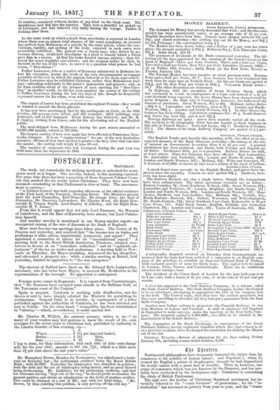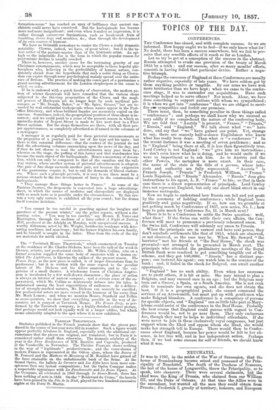fi4t tOratrts.
Sentimental philosophers have frequently lamented the injury done by commerce to the nobility of human nature ; and Napoleon I, when he termed the English a nation of shopkeepers, thought he had stigmatized the hostile nation with a great deal of severity. There is, however, one crime of commerce which was not foreseen by the Emperor, and has probably been overlooked by the lachrymose sage : Commerce is consuming the vitals of British Pantomime. The sigh over the decline of Christmas theatrical merriment has invariably referred to the "comic business" of pantomime ; for the "introduction" has increased in potency from year to year, and the "trains formation-scene" has reached an apex of brilliancy that ancient machinists could never have conceived. But the harlequinade has become more and more insignificant; and even when it makes an impression, it is rather through extraneous fascinations, such as break-neck feats of tumbling, clever dogs awl monkies, &c., than through the development of its own sources of humour.
We have no Grimaldi nowadays to render the Clown a really dramatic notability. Clowns, indeed, we have, of great talent ; but it is the talent rather of the posture-master than of the histrionic artist. An epitaph on the inimitable Joe is the form in which the popular reason for pantomimic decline is usually couched. There is, however, another cause for the increasing gravity of our Christmas entertainments, which may be acceptable to those hopeful philosophers who, believing in the perfectibility of human nature, consistently shrink from the hypothesis that such a noble thing as Clowndom can expire through some psychological malady spread over the entire race of Britons. The practice of making the comic part of a pantomime a grand moving advertisement for the London shopkeepers is the cause to which we refer.
If he is endowed with a quick faculty of observation, the modern patron of winter theatricals will have remarked that the various shops subjected to the thieving propensities of the Clown and the magical powers of Harlequin are no longer kept by such mythical personages as "Mr. Dough, Baker," or Mr. Spice, Grocer," but are teminted by real substantial tradespeople whose names appear in the Post'office Directory, and whose brilliant facades are accurately copied on the canvass. Sometimes, indeed, the geographical position of these shops is incorrect ; and we could point to a scene of the present season in which an umbrella-dealer of Regent Street is made to live next door to a Fleet Street optician. But the shops themselves are there, with all their proper appurtenances, as completely advertised as if named in the columns of a newspaper.
A manager is as regularly paid for these pictorial announcements as the proprietor of a journal for the use of his type and his space : but there is this essential difference—that the readers of the journal do not find the advertising columns encroaching upon the news of the day, and if they do not choose to read the advertisements may pass them by ; whereas on the stage, the puffing of this hatter and that watchmaker has become the main object of the harlequinade. Hence a monotony of decoration, which can only be compared to that of the omnibus and the railway station, where another system of pictorial advertisement is adopted. One pair of fine shops succeeds another pair, not because the exigencies of the pantomime require it, but to suit the demands of liberal customers. Where such a principle prevails, it is easy to see there must be a serious obstacle to the free development of fancy in the construction of harlequinade.
" They manage these things better in France." At some of the Parisian theatres, the drop-scene is converted into a huge advertisingsheet, in which the names of modistes and chiropodists are displayed with as much taste as is possible under the circumstances. By this system a very ugly curtain is exhibited all the year round ; but the drains itself remains inviolate.





























 Previous page
Previous page